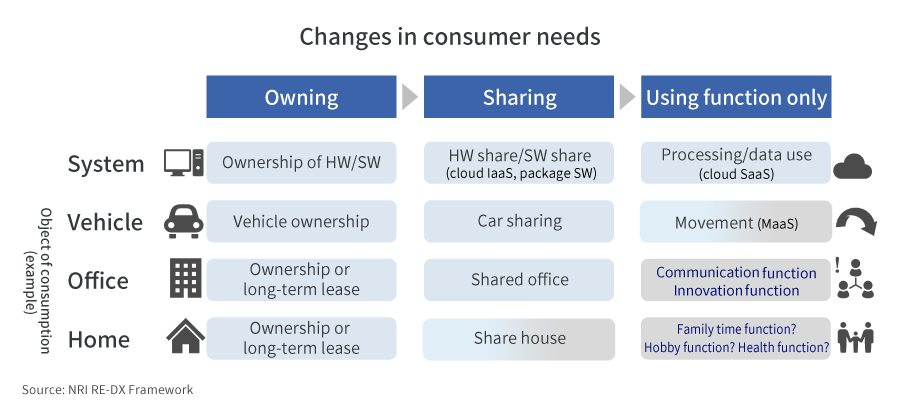Jun. 03, 2020
As digital transformation (DX) advances, services differing significantly from the conventional style of purchasing and owning things are emerging one after another, and the values of consumers on the receiving side of those services are also changing. Reforms are needed at many companies in order to response to these changes in consumer values. What will consumers really be looking for going forward? We asked Katsuhiro Kuriyama of NRI, who works with companies to address this challenge.
Consumer needs are changing from “ownership” to the use of “functions” of things
At present, the needs of consumers are changing from “ownership” to “sharing” of things, and they will soon change to the use of “functions” alone. The automobile industry is one example where this change is prominent.
Conventionally, the automobile industry was a quintessential manufacturing industry, manufacturing and selling vehicles. Now, that business model is being shaken to its core. At the base of this is the change in consumer mindsets: it suffices to “share” and use cars rather than “own” them, or going further, it suffices merely to achieve a “function”, namely, movement to a destination. Consumers use shared services instead of owning cars individually. As long as they can move, they don’t care if the transportation means is a bus, a train, a taxi, or Uber. In other words, what consumers want is not a car, but the use and realization of the “function” of moving from point A to point B. It is believed that consumer mindsets are changing in this way. This perspective serves as the premise of MaaS (Mobility as a Service).
In this sense, the automobile industry of the future will not be able to make do with just manufacturing and selling vehicles. It must provide to customers the “service” of movement, in other words, become a service industry. Moreover, it is also believed that if there is an “objective” to the action to be performed at the destination, the movement itself is not necessarily required as long as the “objective” can be achieved, and service from a totally different perspective from the past will be needed.

The importance of something “that can only be obtained there”
This trend of service industry transformation is occurring in many industries. For example, the real estate industry, where it is said that IT advancement is comparatively delayed, is no exception.
In the real estate industry conventionally, it was considered particularly important to secure and provide to customers properties on land with good access. For an office, there was absolute value in having a property in a place like Marunouchi or Otemachi, where the surrounding environment has everything and transportation is supremely convenient. However, this value is also changing greatly.
Now that teleworking environments have been set up, even meetings, discussions, and seminars can be carried out over a network, and it is not strictly necessary to go to an office to work. Moreover, people’s movement is restricted because of the recent Covid-19 pandemic and many people are forced to work at home via telework. In this situation, even people who previously had no experience with telework started to experience its functions and appeal, and the fact of being able to work without any commute. We now hear some people, especially young employees who are highly adaptable, wonder if there was ever any need for them to go to the office to begin with. By the time these young people reach their 40s and 50s and have become central to decision-making at major companies, the style of commuting to the office for work will no doubt have changed significantly. That means that the merits of a location itself will relatively decrease.
Of course, it’s unlikely that offices will disappear altogether. However, it is thought that their role will inevitably change. Offices will come to need not just to provide a convenient and comfortable environment, but also to provide something “that can only be obtained there”, such as the ability to work better, something that makes it worth the trip, or something inspiring. For example, in work using a network, like online meetings, information exchange following the objective progresses smoothly, but “chance events” like those that happen when people are coming and going in an office, and the resulting creativity, are unlikely to occur. This is like buying designated books from Amazon; there are few chance encounters like being at a bookstore and picking up a book that one normally wouldn’t have noticed. Perhaps we can say that offices of the future will need to provide this sort of element and serve as the soil for the creation of innovation and communication.
Discerning the value that can only be obtained at a real location
At present, the impact of the reduction in users of public transportation has also emerged as a result of Covid-19. This may be an early sighting of the scenery we will see after people’s behavior has changed because of the further development of telework environments in the future. Going forward, even public transportation agencies will likely need to adopt the perspective of a service industry, not just serving as a means for movement to a destination, but creating new value desired by customers.
The same is true of retail stores that sell goods. Until now, physical retail stores have managed to operate because customers visit and buy the products there, but this will also change. Now that everything can be purchased on the internet, what is it that can only be provided at physical stores? Perhaps it is a place for contact with customers, or a place where products and customers can meet “by chance”. Already, stores are appearing that do not have the objective of sales, but rather have observation of customer reactions upon seeing a product as their only objective.
The industry where you work is also no exception. Every industry is transforming into a service industry. When that happens, the most important thing will be to have insight into the true nature of what kind of customer experience (CX) is being sought and to provide truly needed services. We at NRI aim to work on addressing this challenge together with all of you.




